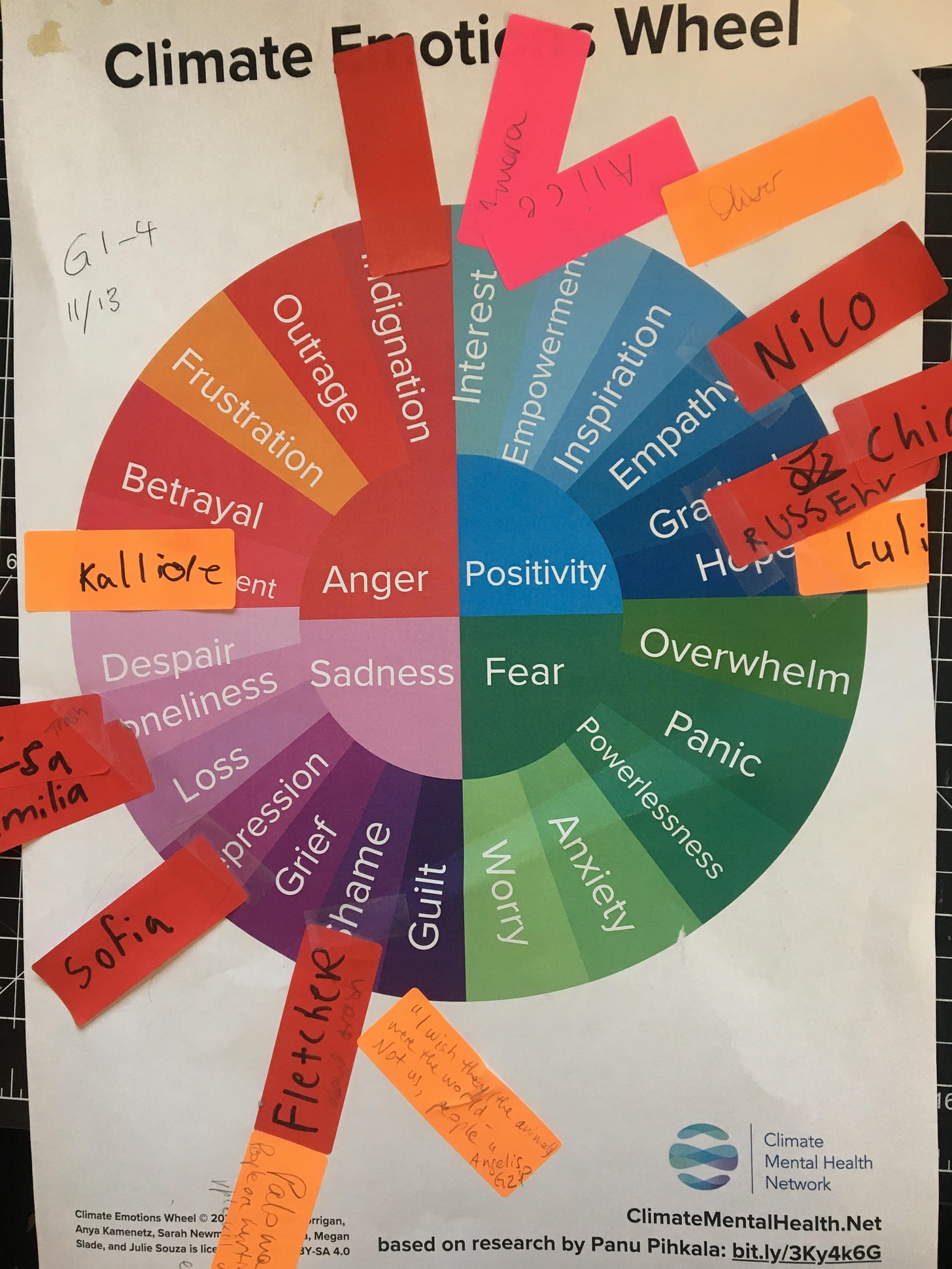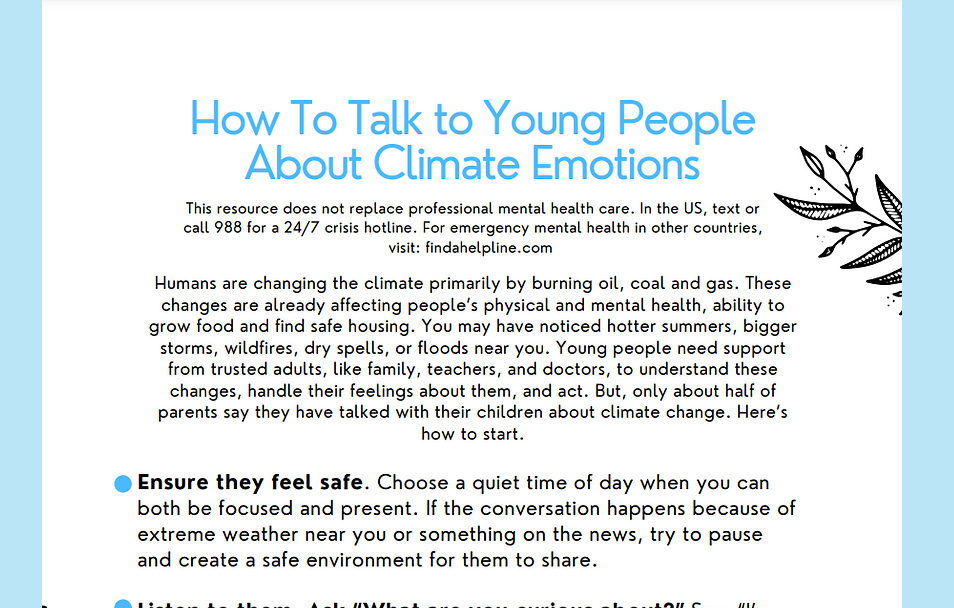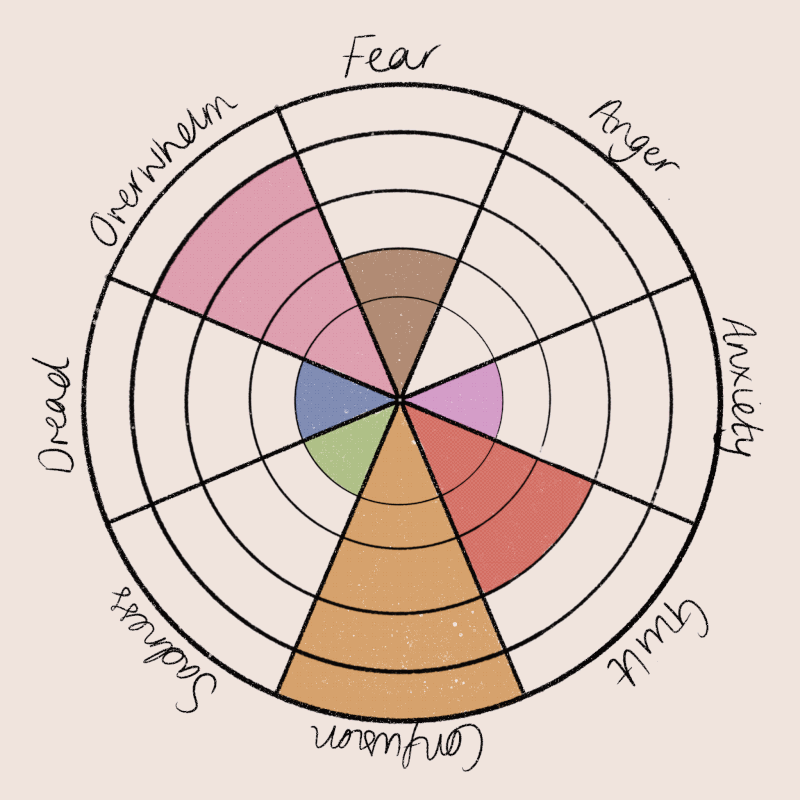What Teachers And Parents Need To Know About Climate Emotions
Resources and ways of taking action.
Hello old friends and new subscribers!
This week’s post is especially designed for sharing.
Forward to your kids’ teacher, or to parents in your class, as a 101 to get the conversation started on climate emotions.
In recent weeks I’ve done a handful of presentations to parents and teachers about climate emotions. I have some coming up, and I’d like to do more! So this post makes the case for why that’s important, as succinctly as I can.
Why schools need to deal with climate emotions on top of everything else they do
To put it mildly, schools, students and teachers have been through it in the past few years. My 2022 book The Stolen Year gets into, not only the global impact of the pandemic on youth, but how the United States in particular relies on public schools in the absence of other social safety nets for children.
We know there’s a youth mental health crisis. Schools are working hard to respond. And teachers are burnt out too.
At the same time, the climate crisis can’t wait, and schools, districts, and states around the country are ALSO working hard to include more comprehensive climate education. Students are demanding it. Teachers and parents agree it’s important. New York State is currently considering it. We’ve already added four “Climate Action Days” in New York City schools this year, which is a good start.
Learning about climate brings feelings
But learning about what’s happening to the earth often brings with it a heavy freight of emotions.
Weather events—like wildfire smoke or flash floods, to name two recent ones in New York City—can trigger climate emotions too.
And, I often hear from parents that climate anxiety can start with material covered in the classroom.
Teachers aren’t prepared
Teachers and other adults often feel underprepared to deal with climate emotions in young people. This topic isn’t part of most social-emotional learning curricula. Nor is it part of most lessons, which understandably tend to stick to the facts on climate change.
And, the best practices for dealing with these emotions don’t fit neatly into a traditional self-care or mental health framework. This is an evolving edge for the world of psychology.
Climate change affects everyone on earth. Climate emotions also affect us all, although we may be anywhere on the scale from denial to panic. So we need collective responses, and we need to take action, because the threat is very real and won’t go away with therapy or pills.
In a paper I cite all the time, Maria Ojala, a Swedish researcher cataloged three kinds of coping that young people use to deal with climate emotions: Emotion-focused coping (like distracting or distancing yourself); problem-focused coping (taking action to address climate change directly); and meaning-focused coping (cognitively reframing the problem, for example by focusing on all the people who are engaged in positive action).
To cope with climate emotions we need to be able to express our feelings, share them with others, practice self-care—and also take action.
Adults and youth may feel distinct emotions, because the climate crisis will be more severe for the young and future generations.
Teachers and other adults may feel moral injury, vicarious trauma, grief and guilt.
Young people may feel acute betrayal, outrage, exasperation, grief and fear, despair and numbness.
Positive climate emotions, like interest, empathy and empowerment, can all be fostered in a school setting too.
Expressing climate emotions means that there’s less of a chance that they stay fixed or stuck. You have the opportunity to work through them and channel them productively.
Opening up a discussion about climate emotions, in school or at home, helps students recognize that they’re not alone and helps adults support each other.
But how?
I helped create an initial guide and set of resources at https://www.climatementalhealth.net/parents.
We’re currently gathering feedback from families through paid focus groups; if you’re interested in participating, please sign up here.
Climate emotions flow
Melissa James, a climate psychologist in Northampton, England, created this animation based on our wheel, and posted an exercise you can do to show how climate emotions fluctuate.
“Our emotions are fluctuating, fleeting, flowing, not static or still and rarely steady.
This is true of all emotions… but, I believe, especially in relation to the climate crisis.
Incorporating a climate emotions wheel into your journalling practice could be a great way to visually represent, not only your emotions relating to climate change, but also how strongly you feel them. When using an emotions wheel, you might also ask yourself;
❓ Who have I spoken to about climate change today?
❓ What climate news have I read today?
❓ Have I taken stock of what I’m grateful for today?
❓ Have I connected with folks who are likely to understand how I’m feeling recently?
❓ Have I spent any time in or observing nature today?"
Often we think we know how we feel, and why we feel it… until we do exercises like this. Mapping our emotions out in this way can lead to surprising insights into what we truly feel, and why we feel them, highlighting the factors that may be helping us find hope, fuelling our fear, or revitalising our resilience. This is important information, and can help you to hold on to your resilience by teaching you when you need to take breaks and how you best recharge when needed.”
Links, Resources
Join me for a January 30 webinar with Elizabeth Bechard & Liz Hurtado of Moms Clean Air Force/Ecomadres and Jenni Silverstein of Climate Psychology Alliance:
Parenting in the Climate Crisis: Self-Care, Connections, And Support.
And check out Jenni on Jade Sasser’s podcast: “Intentional Parenting through Climate Crisis”
Climate-informed therapy and parent coaching
Jo DelAmor works with parents and has a forthcoming book
Ways of taking action : https://www.obligatorynoteofhope.com/
Sunrise Movement is actively holding virtual onboarding meetings right now https://www.sunrisemovement.org/take-action/








